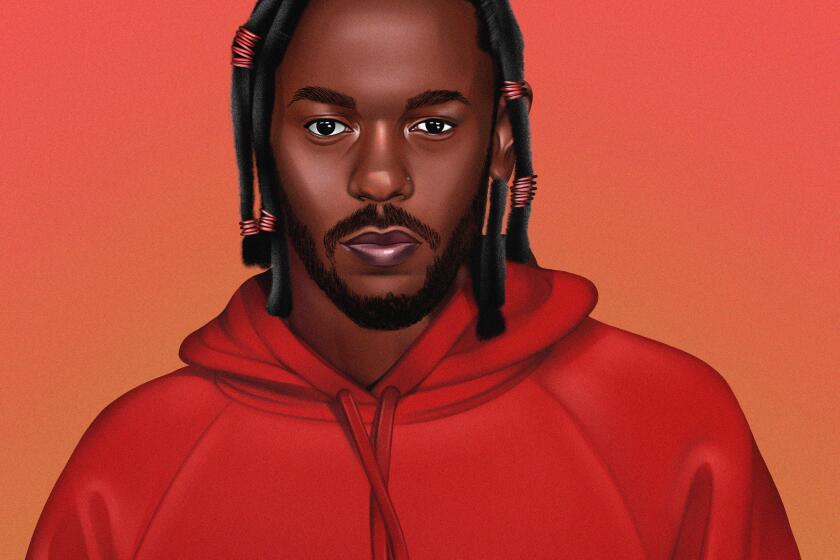Latin Grammys get down to music
It was obvious in the first 60 seconds that this was not going to be the same old Latin Grammys we’ve seen on CBS for the last five years. And it wasn’t just the switch from English to Spanish that marked the difference right out of the box as the sixth annual music awards show aired for the first time Thursday on Univision, the country’s major Spanish-language network.
The moment the program’s co-hosts started to talk, a whole new cultural chasm opened up for me as I looked down on the stage from the balcony at the Shrine Auditorium. It hit me like a relampago: Latinos don’t have smart-alecky, wisecracking awards-show hosts whose personalities are as important to the program as any of the performers or presenters.
Where is the Mexican David Letterman? The Brazilian Billy Crystal? The Colombian Whoopi Goldberg?
Instead, Univision gave us the Latino Ken and Barbie: Mexican actor Eduardo Santamarina and Mexican TV personality Rebecca de Alba, a pair so proper and put-together as to appear mechanical. Their role was to provide straightforward announcing, not comic relief. For that, they needed to look good and enunciate, which is what they did.
But seriously, folks, this may actually point to a valid underlying cultural issue. Perhaps it’s the Latino notion of respect, which may preclude letting a comedian take potshots at stars from the podium just for laughs. Latinos want their artists revered, not ridiculed. That’s why there’s no such thing as a Mexican roast.
In any case, the neutrality of the hosts put the whole focus of the program on the artists and the performances. And for once in the history of the Latin Grammys, that was a good thing.
There were no show-stoppers or super razzle-dazzle special effects, except for that dancer who seemed to fly off into the rafters during the norteno performance of “Aire” by Intocable. Most of the time, the artists just came on stage and did their songs.
Some acts were less thrilling than anticipated, such as the all-star salsa number led by pianist Bebo Valdes and bassist Israel “Cachao” Lopez. Some surpassed expectations, such as the rousing segment featuring a delegation of reggaeton stars including Vico C and Tego Calderon, who traded off vocals based on a classic salsa theme, “Quitate Tu” (Step Aside), used by the Fania All-Stars to highlight great salsa singers of the ‘70s.
And Bebe, the Spanish singer who was named best new artist, did a searing version of her nominated song “Malo,” which rages so effectively against abusive men. This is one case in which TV enhanced the performance. I got home in time to see Bebe again on Univision’s delayed telecast, this time catching her intense expressions in the camera close-ups.
The program, in short, had its highs and lows. The difference this year was that, good or bad, the music was presented on its own terms.
In the past, there was one fundamental problem with the program on CBS: The producers didn’t have faith in Latin music. They didn’t think it would draw viewers on its own, so they obsessively tried to make it more palatable to a mainstream, non-Latin audience by manufacturing meaningless duets (Jessica Simpson with David Bisbal, Destiny’s Child with Alejandro Sanz) or by featuring Latino artists whose music sounds more like U.S. pop (Paulina Rubio and Ricky Martin).
How can you showcase the best in Latin music, which is the ceremony’s stated mission, if you don’t believe in it? The Latin Grammy telecasts were never a celebration of culture. They were a tortuous, two-hour display of one culture humiliating itself to win acceptance by another.
The Latin Grammys were not alone. This year on the Oscar telecast, Uruguayan singer-songwriter Jorge Drexler was not allowed to perform his nominated song “Al Otro Lado del Rio,” from “The Motorcycle Diaries.” In a bid for name recognition, the producers chose actor Antonio Banderas to do an overwrought rendition of the sensitive song, backed by the busy guitar of Carlos Santana.
It didn’t have to be this way. A few weeks later, Jay Leno invited Drexler to finally do his own song justice with a solo performance on “The Tonight Show.” It was a hushed and moving moment.
Drexler won the Oscar for best song. So where was he during Thursday’s Latin Grammys, in which his song was also nominated? You would think Univision would be eager to spotlight the first Latino to win an Oscar for songwriting.
A skeptic might speculate that his absence from the broadcast was political, since the song is a subtle endorsement of the philosophy, or at least ideals, of the movie’s lead character, Che Guevara. But we don’t know. (Drexler’s publicist said Friday that the musician was not invited. A representative of the Latin Recording Academy said of the decision, “We don’t get involved in politics. This is about the music.”) In any case, it’s not likely that the switch to Univision will help surmount one of the thorniest issues that has plagued the Latin Grammys since the awards were launched: the Cuban problem.
In fact, things may get worse for artists from Cuba who have been blocked by politics from appearing on, or even attending, the show in past years. Based in Miami and heavily influenced by the anti-Castro Cuban exile community there, Univision is extremely unlikely ever to allow a great band such as Havana’s Los Van Van, also nominated for a Latin Grammy this year, to set foot on its stages.
Plus ca change, as the saying goes.
More to Read
The biggest entertainment stories
Get our big stories about Hollywood, film, television, music, arts, culture and more right in your inbox as soon as they publish.
You may occasionally receive promotional content from the Los Angeles Times.










